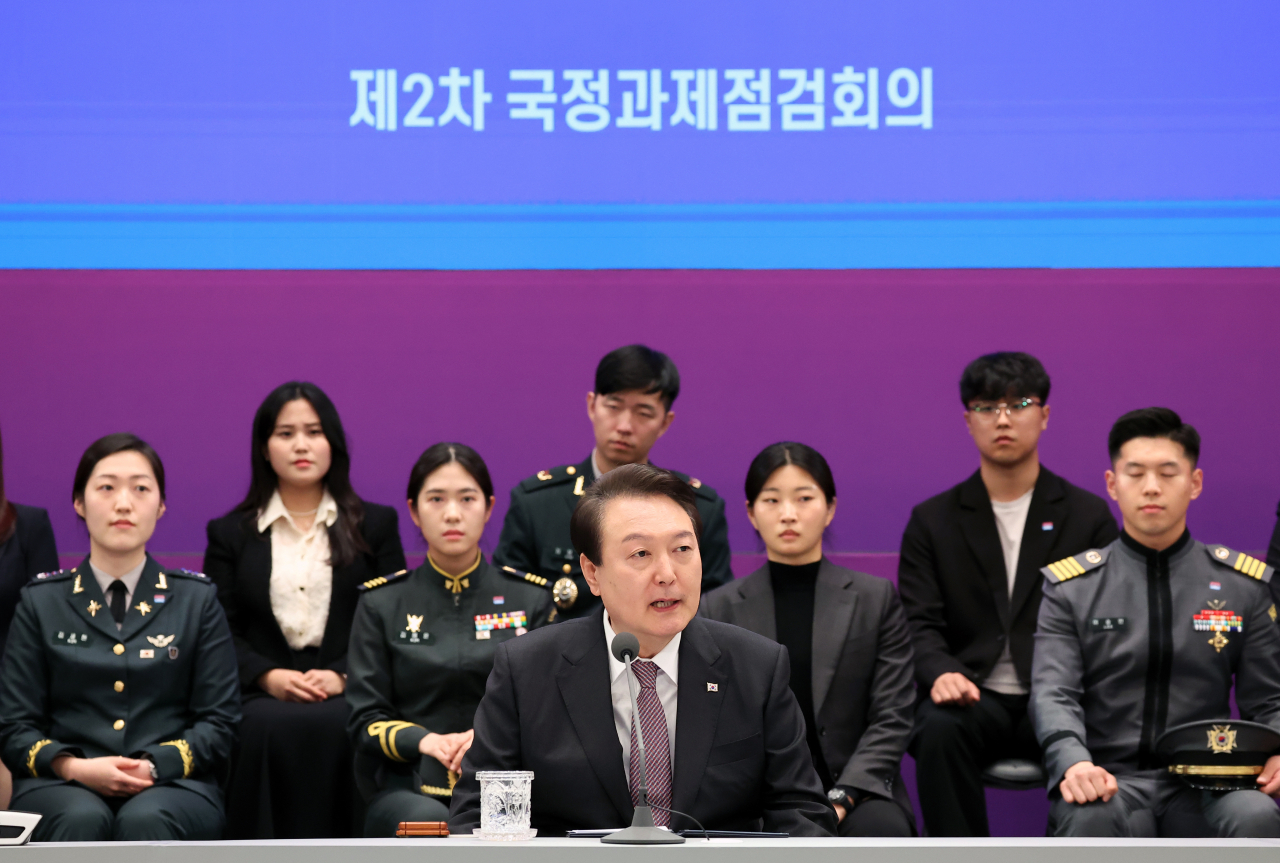 |
President Yoon Suk Yeol speaks at the national inspection meeting held at Yeongbingwan, the state reception hall of Chung Wa Dae, on Wednesday. (Yonhap) |
President Yoon Suk Yeol has reiterated the importance of cooperation and solidarity with countries that share universal values at a meeting on national affairs Wednesday, underscoring the need for security collaboration with the United States and Japan to counter the North Korean threat.
Yoon presided over the second national task inspection meeting to discuss major diplomatic and security issues, including Korea-Japan relations and North Korean nuclear threats, with 100 experts and citizens, according to the presidential office.
During his opening speech, Yoon said that his administration prioritizes "solidarity and cooperation with nations that uphold universal values such as freedom, human rights and the rule of law." He also noted that such solidarity is critical for the country's survival, national interest, liberal democracy and the market economy.
Noting that “state affairs” and “diplomacy” are two sides of the coin, the president said the country’s future is at stake in strengthening supply chains and securing technological advantage through high-tech innovation in the face of a complex crisis.
President Yoon also explained his administration’s diplomatic and security achievements.
He said cooperation among South Korea, the US and Japan is “more important than ever” to overcome the severe security crisis, including the global complex crisis and the North Korean nuclear threats.
“The South Korea-US alliance has already developed into a comprehensive global strategic alliance beyond a military security alliance, and the importance of Korea-Japan relations cannot be overemphasized,” he said.
Yoon sought to mend ties with Japan over long-standing issues related to wartime forced labor by giving a commemorative speech stressing a partnership with Japan on March 1, a day to mark the protest movement for independence from Japan, and proposed a third-party compensation plan for the victims. His approval rating dropped as public opinion turned sour.
Regarding North Korean provocations, Yoon said the security situation on the Korean Peninsula and in Northeast Asia is “more serious than ever” due to North Korea’s recent illegal nuclear and missile development and a series of provocations.
“We need to strengthen the alliance's extended deterrence capability and restore the Korean-style three-axis system,” he said.
The three-axis system refers to the South Korean military’s response plan to intercept and destroy North Korea’s nuclear weapons and missiles and destroy key facilities such as its command. This system includes the Kill Chain system, the Korea Air and Missile Defense and the Korea Massive Punishment and Retaliation plan.
The Kill Chain system would launch a preemptive strike against the North's missile facilities and possibly its leadership if an imminent attack is detected; the KAMD would intercept North Korean missiles heading for the South; and the KMPR would be used to take out North Korea's leadership and military facilities if it strikes South Korea.
“Under any circumstances, when we are attacked first, our military must establish a firm view of the enemy and discipline so that we can fight and win, and maximize our capabilities through effective combat training,” he said.
Last month, the government publicly published a North Korean human rights report for the first time in order to properly publicize the human rights situation in North Korea, he said.
“It is most important to widely publicize the gruesome human rights abuses of North Koreans in the international community at home and abroad, and we must strive to ensure that the North Korean Human Rights Act is practically implemented.”
He also explained that he took economic and security cooperation with Saudi Arabia and the United Arab Emirates to the next level and implemented “sales diplomacy” in all directions to produce practical results and benefits in summit diplomacy.
In January, Yoon was invited by Emirati leader Sheikh Mohammed bin Zayed Al Nahyan as the first state visit by a Korean leader, drawing $30 billion from the nation during a summit.
According to military media Janes on Tuesday, South Korea's Chunmoo multirange rocket was deployed to Saudi Arabia's military. In March last year, Saudi Arabia’s state-run news agency SPA reported that the Saudi Defense Ministry signed a $800 million contract from Hanwha Aerospace to introduce the Chunmoo system, although it was not confirmed by the Korean government or Hanwha Aerospace.



![[Herald Interview] 'Trump will use tariffs as first line of defense for American manufacturing'](http://res.heraldm.com/phpwas/restmb_idxmake.php?idx=644&simg=/content/image/2024/11/26/20241126050017_0.jpg)

![[Health and care] Getting cancer young: Why cancer isn’t just an older person’s battle](http://res.heraldm.com/phpwas/restmb_idxmake.php?idx=644&simg=/content/image/2024/11/26/20241126050043_0.jpg)

